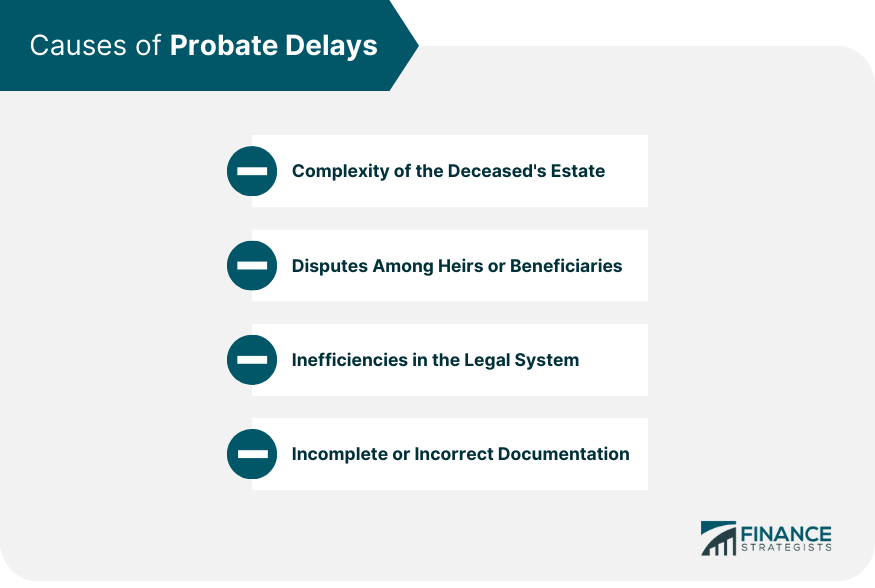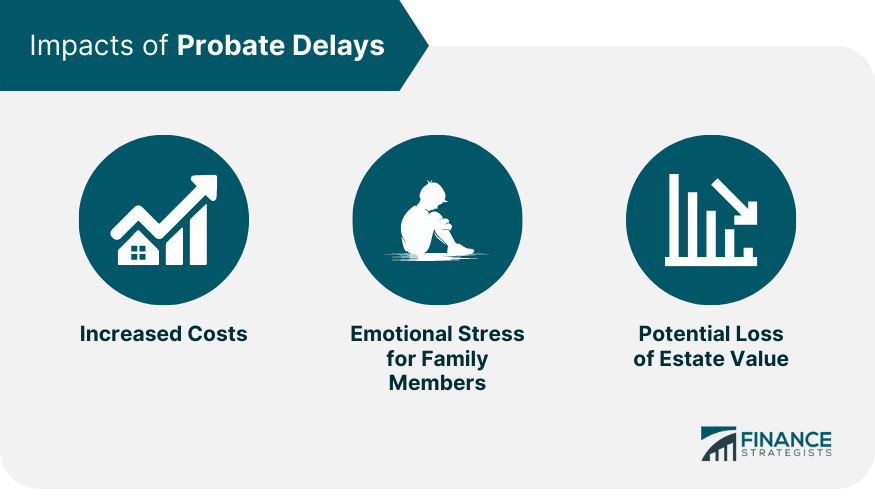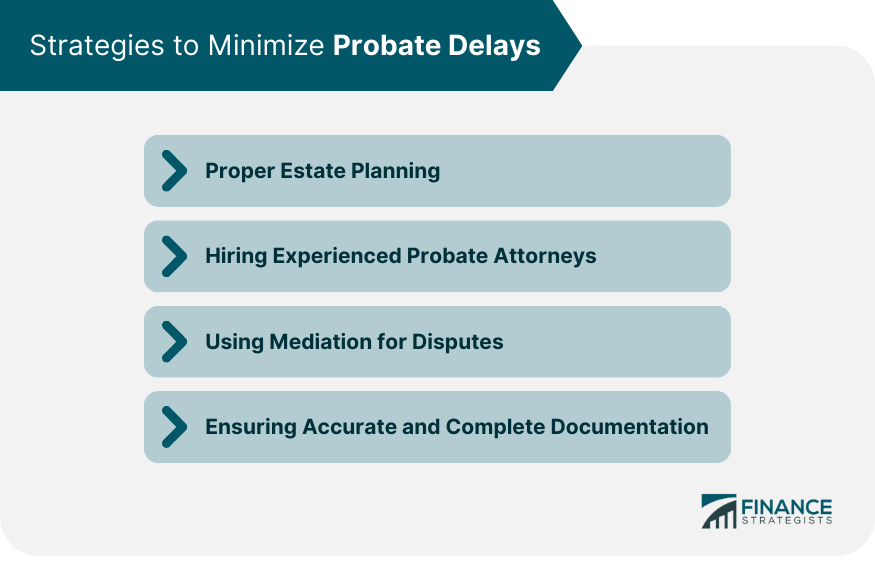Probate delays occur when the process of settling an estate takes longer than expected. These delays can span months or even years, significantly hindering the distribution of assets to the rightful heirs and beneficiaries. Probate is a legal process where the estate of a deceased person is managed and distributed. It involves validating a will, if one exists, inventorying the deceased person's assets, paying debts and taxes, and distributing the remaining assets to heirs or beneficiaries. Addressing probate delays is essential to ensure the timely settlement of an estate. Prolonged probate can result in financial strain, emotional distress for the bereaved, and in certain circumstances, depreciation in the value of the estate assets. When an estate consists of a multitude of diverse assets such as various real estate properties, multiple businesses, and extensive investments, the process becomes more complex and time-consuming. Assets such as real estate or businesses may require additional procedures like valuation or sale, further slowing the process. For instance, if a decedent owned property in multiple states, probate may need to be conducted in each of those states. The valuation of businesses can also be challenging, involving thorough audits and even negotiations with potential buyers. Thus, the more complex the deceased's estate, the longer the probate process might take. Disagreements might arise due to the interpretation of the will, the division of assets, or even the authenticity of the will itself. When a will is perceived as inequitable, beneficiaries might decide to contest it, initiating a legal process that could take months or even years to resolve. Similarly, if the legitimacy of the will is questioned, the court must investigate the matter, leading to further delays. Consequently, any form of contention among the beneficiaries can result in a considerable extension of the probate process. The probate process is regulated by the courts, and unfortunately, court procedures can often be slow and bureaucratic. Limited court resources, such as the number of judges or clerks, and high caseloads, can lead to scheduling issues and a backlog of cases, subsequently delaying the progress of probate. Moreover, procedural formalities, while necessary, can also extend the time it takes for probate to conclude. If the documentation provided is incomplete or contains errors, it will require correction, leading to a halt in the probate process until the documents are updated and verified. Mistakes in the will, a lack of crucial documents such as tax returns or property deeds, or inaccuracies in the list of assets can all result in considerable delays. This emphasizes the importance of careful preparation and the meticulous handling of all documents related to the deceased's estate. When the probate process drags on, administrative costs continue to accrue, including legal fees, court costs, and expenses related to maintaining the estate. These costs can rapidly eat into the estate's worth, leaving less to be distributed among the heirs or beneficiaries. For instance, the ongoing costs associated with maintaining a property, such as taxes, utilities, and upkeep, can accumulate over time. Legal and court costs, too, can mount up as lawyers work longer on the case and additional court fees are incurred. Also, any outstanding debts or obligations of the deceased continue to accrue interest, further diminishing the estate's value. Moreover, the assets tied up in probate may be needed to provide for the financial needs of the deceased's dependents. A delay could result in financial hardship for these individuals, particularly if they relied heavily on the deceased for financial support. The bereavement process is already stressful, and delays in probate can add an additional layer of stress, uncertainty, and frustration. Family members might feel like they are in limbo, unable to move forward until the estate is settled. This can lead to feelings of frustration and helplessness. The longer the delay, the more the emotional strain intensifies, potentially leading to conflict among family members and even long-term estrangement. Moreover, disputes over inheritance can bring underlying family tensions to the surface, causing further emotional distress. When a probate case becomes contentious, family members are often forced to take sides, which can lead to broken relationships and lasting animosity. Certain types of assets, if not managed promptly, may depreciate over time. For instance, a house that is not adequately maintained can lose value. A business that is not efficiently managed during probate could lose its clients or market position, significantly reducing its worth. Investments also need active management to preserve their value. An investment portfolio left unmanaged could underperform, leading to losses. Additionally, delays could force the executor to liquidate assets at a less than optimal time – for instance, selling stocks during a market downturn – to pay for ongoing expenses, further reducing the estate's value. By understanding the impacts of probate delays, steps can be taken to mitigate these issues, making the probate process smoother and less stressful for everyone involved. Comprehensive estate planning goes beyond merely writing a will. It involves a thorough understanding of your financial situation, considering your assets, liabilities, and their implications on your heirs or beneficiaries. Having a detailed, accurate, and up-to-date will is a fundamental component of estate planning. It should clearly specify how your assets should be distributed after your demise and to whom. Any ambiguity can lead to disputes among beneficiaries, thereby causing probate delays. A will should also appoint a reliable executor who will be responsible for managing the probate process. In addition to a will, consider setting up trusts. A trust can bypass the probate process, thereby enabling quicker and smoother transfer of assets to beneficiaries. There are different types of trusts to cater to various needs. For instance, a revocable living trust allows you to retain control of your assets during your lifetime and distribute them without probate upon your death. Estate planning should also account for potential taxes. Without proper tax planning, your heirs could be left with substantial tax liabilities, which could force them to sell off assets, often in a hurry and potentially at a loss. Probate attorneys are experts in estate law. They can guide you through every step of the probate process, ensuring compliance with all legal requirements. Their expertise can help prevent common mistakes that often lead to probate delays. These can include errors in paperwork, incorrect asset valuation, and oversight of creditor claims. Additionally, a probate attorney can be instrumental in resolving disputes among beneficiaries. Their neutral perspective and legal expertise can help mediate disagreements and provide solutions acceptable to all parties, thereby preventing time-consuming and expensive litigation. Mediation involves a neutral third-party mediator who facilitates dialogue between conflicting parties. The mediator does not impose a decision; instead, they help parties communicate their viewpoints and interests effectively, encouraging them to arrive at a mutually agreeable resolution. Not only does mediation often resolve disputes more quickly than court battles, but it also maintains privacy and can help preserve relationships among family members, which can be strained during legal disputes. It's a more amicable, cost-effective, and faster way to address disagreements, thereby reducing probate delays. Any discrepancies, inaccuracies, or lack of essential documents can complicate the probate process and lead to significant delays. For instance, if the will is not up-to-date, it may not reflect your current wishes and assets, leading to disputes among beneficiaries. Similarly, inaccuracies in the inventory of assets can lead to issues during asset valuation and distribution. It's advisable to review and update your estate documents periodically and after major life events such as marriage, divorce, or the birth of a child. A probate attorney can guide you through this process, ensuring that your documentation is comprehensive and accurate. Probate delays can significantly impede the timely distribution of assets to rightful heirs and beneficiaries, creating financial strain and emotional distress. These delays can be caused by factors such as the complexity of the deceased's estate, disputes among beneficiaries, inefficiencies in the legal system, and incomplete or incorrect documentation. The impacts of probate delays include increased costs, emotional stress for family members, and a risk of potential loss in the value of assets. To minimize probate delays, it is crucial to engage in comprehensive estate planning, hire experienced probate attorneys, utilize mediation as a means of conflict resolution, and ensure accurate and complete documentation. By implementing these strategies, individuals can mitigate the challenges associated with probate delays, facilitating a smoother settlement of estates and reducing financial strain, emotional distress, and potential losses for all parties involved.What Are Probate Delays?
Causes of Probate Delays
Complexity of the Deceased's Estate
Disputes Among Heirs or Beneficiaries
Inefficiencies in the Legal System
Incomplete or Incorrect Documentation

Impact of Probate Delays
Increased Costs
Emotional Stress for Family Members
Potential Loss of Estate Value

How to Avoid Probate Delays
Proper Estate Planning
Hiring Experienced Probate Attorneys
Using Mediation for Disputes
Ensuring Accurate and Complete Documentation

Final Thoughts
Probate Delays FAQs
Probate delay refers to the extended period of time it takes to settle an estate, resulting in a significant hindrance to the distribution of assets to rightful heirs and beneficiaries.
Probate delays can be caused by various factors, including the complexity of the deceased's estate, disputes among heirs or beneficiaries, inefficiencies in the legal system, and incomplete or incorrect documentation.
Disputes regarding the interpretation of the will, division of assets, or even the authenticity of the will itself can lead to lengthy legal processes and court proceedings, resulting in substantial delays in the probate process.
Yes, limited court resources, such as the number of judges or clerks, and high caseloads can lead to scheduling issues and a backlog of cases, ultimately slowing down the progress of probate and causing delays.
Incomplete or inaccurate documentation, such as errors in the will, missing tax returns or property deeds, or inaccuracies in the list of assets, can require correction and verification, causing a halt in the probate process until the documents are updated. These delays can significantly prolong the settlement of the estate.
True Tamplin is a published author, public speaker, CEO of UpDigital, and founder of Finance Strategists.
True is a Certified Educator in Personal Finance (CEPF®), author of The Handy Financial Ratios Guide, a member of the Society for Advancing Business Editing and Writing, contributes to his financial education site, Finance Strategists, and has spoken to various financial communities such as the CFA Institute, as well as university students like his Alma mater, Biola University, where he received a bachelor of science in business and data analytics.
To learn more about True, visit his personal website or view his author profiles on Amazon, Nasdaq and Forbes.











